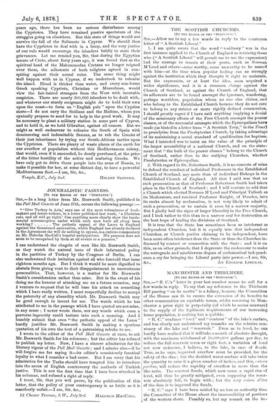THE SCOTIISH CHURCHES. (To THE EDITOR OF THE SPEOTATOR."I
SIR,—Allow me to say a few words in reply to the courteous letter of "A Scottish Liberal."
1. I am quite aware that the word " residuary " was in the first instance applied to the Church of England as retaining those who (" A Scottish Liberal" will permit me to use the expression) had the courage to remain at their posts, such as Norman M'Leod and others—some worthy, some unworthy to be named with him—at the time when popular feeling ran so strongly against the institution which they thought it right to maintain. But the expression, or at least the idea, soon acquired a wider significance, and it is a common charge against the Church of Scotland, as against the Church of England, that its adherents are to be found amongst the ignorant, wandering, perhaps worthless, population whom no one else claims, and who belong to the Established Church because they do not care to belong to any stricter or more rigidly defined communion. I should greatly regret if I have said anything implying a denial of the missionary efforts of the Free Church amongst the poorer classes, or of the successful attempts which the Episcopalians have made (as hinted in a letter from "A Scottish Tory," in the Times) to proselytise from the Presbyterian Church, by taking advantage of its maintaining a moral standard of qualification for baptism. What I intended was to insist on the value of the principle of the larger accessibility of a national Church, and on the state- ment that "the bulk of the poorer classes" belong to the Church of Scotland, rather than to the outlying Churches, whether Presbyterian or Episcopalian.
2. With regard to Dr. Robertson Smith, it is no concern of mine to defend the conduct of individual Professors in the Established Church of Scotland, any more than of individual Bishops in the Established Church of England. All that I said was that no such prosecution as that of Professor Robertson Smith had taken place in the Church of Scotland ; and I will venture to add that a Church which elected Norman M'Leod and Principal Tulloch as its Moderators, and received Professor Knight, of Dundee, into its ranks almost by acclamation, is not very likely to admit of such a prosecution, or to sustain it even by a narrow majority. But I gladly hail the signs of larger liberality in the Free Church, and I look rather to this than to a narrow zeal for destruction as the best hope of healing the divisions of Scotland.
It is true that the State has sometimes been as intolerant as independent Churches, but it is equally true that independent Churches, or Church parties claiming to be independent, have been more often intolerant than the State or than the Churches in- fluenced by contact or connection with the State ; and it is on this, as on other grounds, that I deprecate the endeavour to make the retrograde and mischievous dogma of ecclesiastical independ- ence a cry for bringing the Liberal party into power.—I am, Sir,


































 Previous page
Previous page